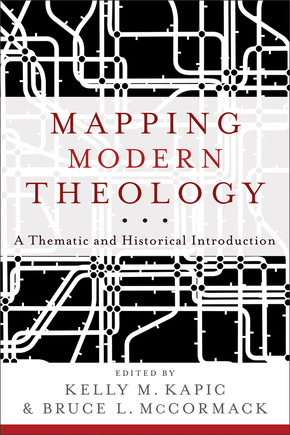Mapping Modern Theology
 Kelly Kapic and Bruce McCormack, eds., Mapping Modern Theology: A Thematic and Historical Introduction (Grand Rapids: Baker Academic, 2012), x + 421 pages, ISBN 9780801035357.
Kelly Kapic and Bruce McCormack, eds., Mapping Modern Theology: A Thematic and Historical Introduction (Grand Rapids: Baker Academic, 2012), x + 421 pages, ISBN 9780801035357.
Most books on contemporary theology trace key themes in theology or focus on the contributions of influential theologians. While these approaches are helpful, it can be easy to miss how contemporary developments in theology have influenced each of the traditional topics in systematic theology. We can be grateful that Mapping Modern Theologyhelps us to see how this is the case.
Mapping Modern Theology is not technically a book on “contemporary theology” broadly speaking, however. Rather, the authors focus specifically on how theologians in the last couple hundred years have responded to modernity. The book begins with an essay by Bruce McCormack which introduces the concept of “modernity” within a theological context. He suggests that “modern” theology emerges when “church-based theologians ceased trying to defend and protect the received orthodoxies of the past against erosion and took up the more fundamental challenge of asking how the theological values resident in those orthodoxies might be given an altogether new expression, dressed out in new categories of reflection” and that philosophically there was a “shift from a cosmologically based to an anthropologically based metaphysics of divine being” (p. 3).

Kelly M. Kapic is professor of theological studies at Covenant College in Lookout Mountain, Georgia.
The remainder of the essays by various evangelical (broadly defined) authors each focus on a different topic in systematic theology (e.g., creation, Christology, Holy Spirit, the Church), primarily from a Reformed Christian perspective. The chapters will be helpful for both non-specialists (although those who have never studied theology would be easily lost) and specialists. For example, the chapter on the Trinity (a topic in which I am well-versed) helped me to better grasp the impact of the “historical” approach to the Trinity in contemporary theology.
This book serves as a good reminder of the impact our philosophical assumptions can have on our theology, even when we are not conscious of them (or even deny them). The book will also serve well anyone who wants to know how the various topics in systematic theology have been influenced by modernity.

Bruce L. McCormack is Charles Hodge Professor of Systematic Theology at Princeton Theological Seminary.
Mapping Modern Theology could serve as a helpful textbook to a course on systematic theology or contemporary theology. At the same time, the strength of the book could also be its weakness, as far as being used as a primary rather than supplemental textbook. That is, in the systematic approach of the book, one could miss the big picture changes happening in theology today and might not get a good sense of who the most influential theologians have been in contemporary theology. This would not be an issue if the course lectures took a different approach than the book. Another concern (which is true for many books) is that readers might get the impression that theology is only about debates where theologians disagree on things, and readers might therefore miss the depth of the historical consensus of the Church on doctrine. While being aware of these concerns, readers will benefit greatly from the contributions in Mapping Modern Theology.
Reviewed by Andrew K. Gabriel
This review first appeared on Andrew Gabriel’s blog, www.andrewgabriel.wordpress.com and is reprinted here with his permission.
Category: In Depth


